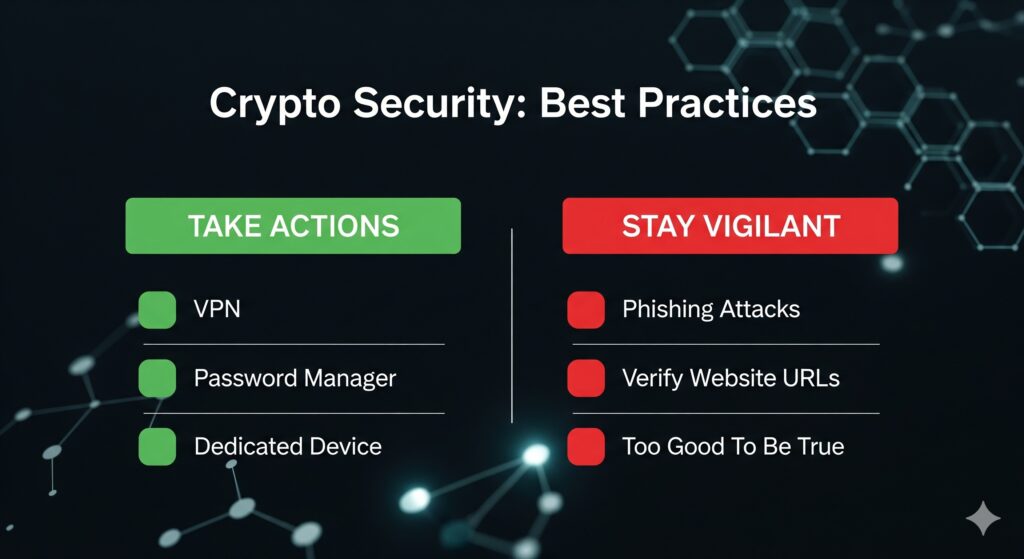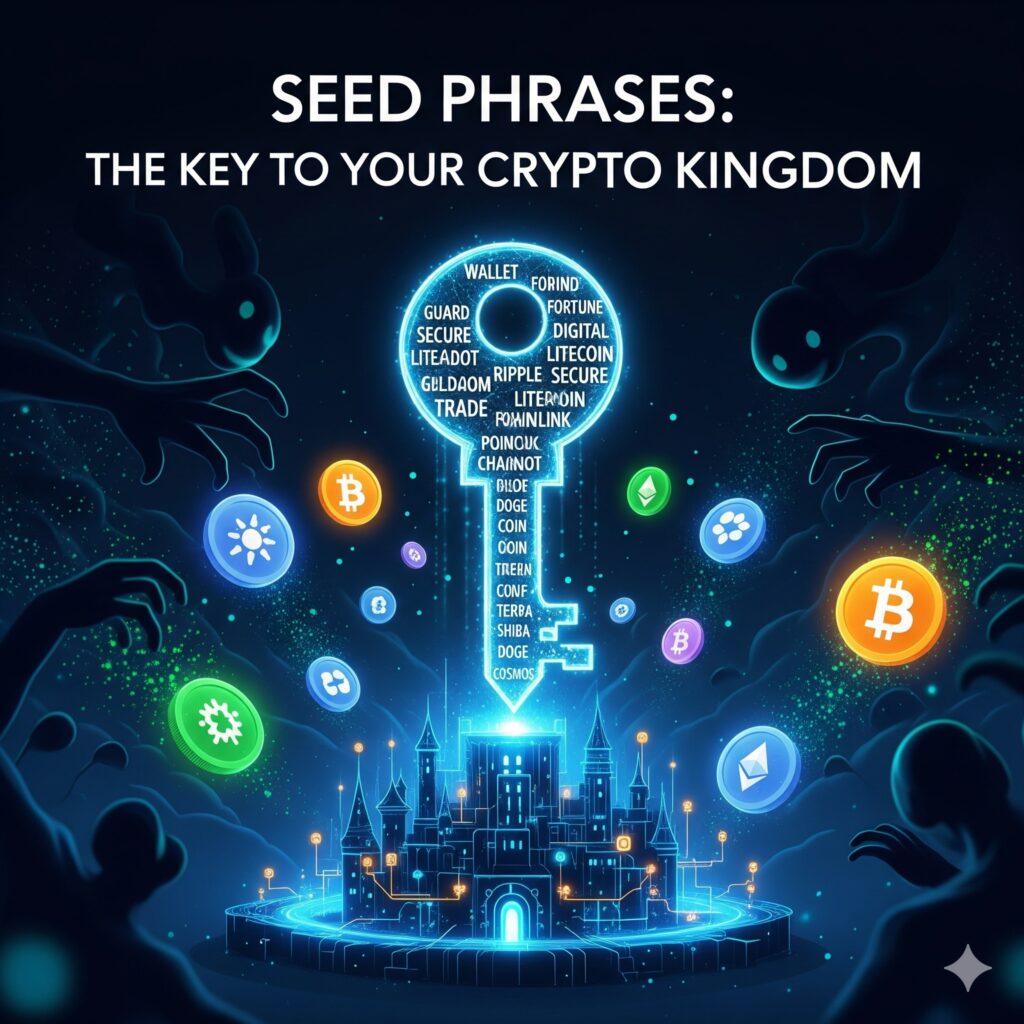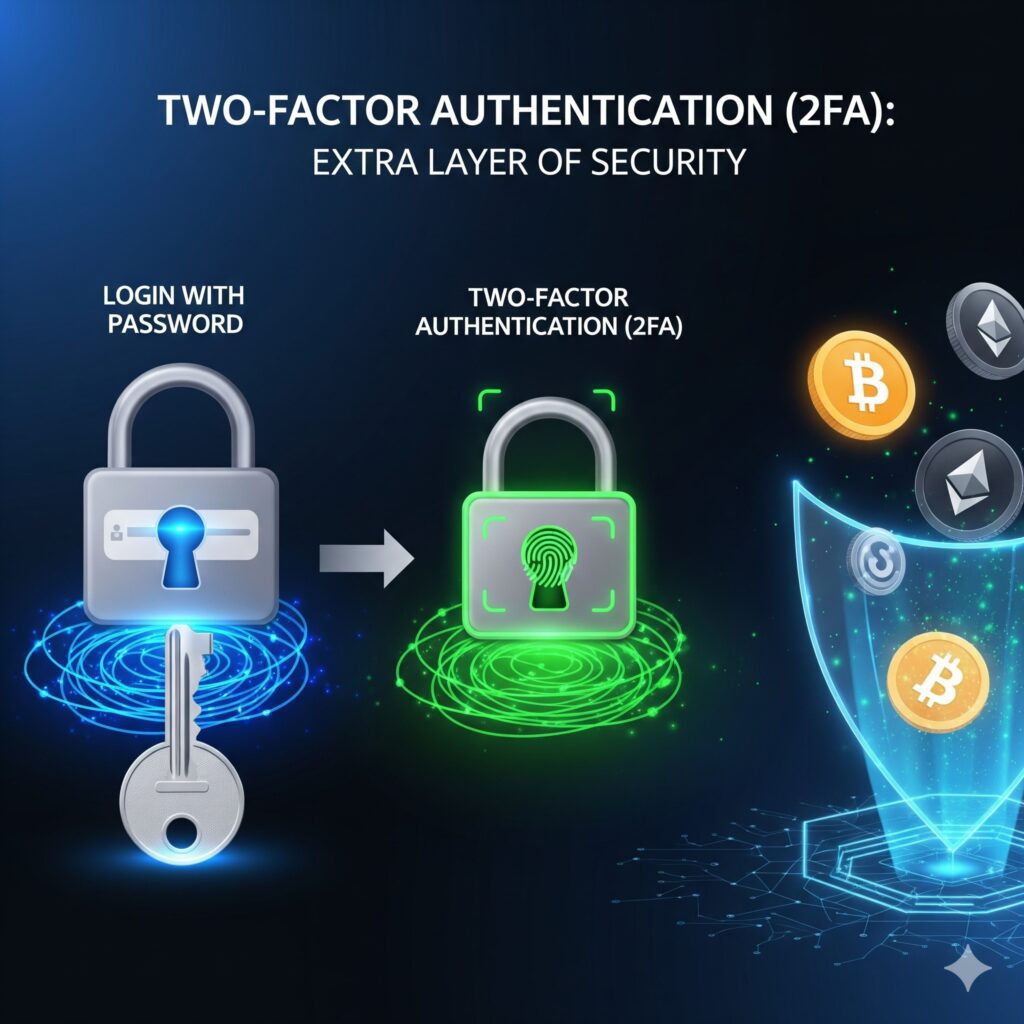Staying Safe in the Crypto World: Pro Hacks
- July 26, 2025
- 6:53 am
- Chinmay J
Advanced Security Tips
Advanced Crypto Security Measures
All important Crypto Security Hacks: Protect your assets
- Use a VPN (Virtual Private Network): A VPN encrypts your internet traffic and masks your IP address, protecting your online activity from surveillance and potential hacking attempts. Use a reputable VPN service.
- Use a Password Manager: A password manager generates and stores strong, unique passwords for all of your accounts. It also helps you avoid reusing passwords, which is a major security risk. Examples: 1Password, LastPass, Bitwarden.
- Use a Dedicated Device: Consider using a dedicated computer or smartphone solely for crypto transactions. This minimizes the risk of malware infection from other activities.
Stay Vigilant: Know Exactly Where You Click
- Be Careful of Phishing Attacks: Phishing attacks are becoming increasingly sophisticated. Always be wary of suspicious emails, websites, and messages, and never click on links or download attachments from untrusted sources. Double-check the sender’s email address and look for typos or grammatical errors.
- Verify Website URLs: Always verify the URL of a website before entering your login credentials or other sensitive information. Hackers often create fake websites that look identical to legitimate ones. Look for the padlock icon in the address bar, indicating a secure connection (HTTPS).
- Too Good to be True: Thats right, its the simplest crypto security hack but the most effective! If someone is sending you 1 Bitcoin for free, you know what to do.
Air-Gapped Wallets
- What are they: Wallets where the device is completely offline and never connects to the internet. Transactions are created on the device, transferred to an online device via QR code or other methods (e.g., SD card), and then broadcast to the network.
- Why use them: Extremely secure, as they are immune to online attacks. The private keys never touch an internet-connected device. Requires a bit more technical know-how to use.
- Example: Using a software wallet on a computer that is never connected to the internet. SafePal S1 is an airgapped wallet, learn more.
Multi-Signature Wallets (Multi-Sig)
- What are they: Wallets that require multiple private keys (signatures) to authorize a transaction.
- Why use them: Adds an extra layer of security, as a single compromised key cannot be used to steal funds. Requires collaboration between multiple parties to move funds.
- Example: A 2-of-3 multi-sig wallet requires two out of three authorized parties to sign a transaction. Jade Plus by Blockstream is a multi-sig supporting crypto wallet.
Staying Informed
- Follow Crypto Security Experts: Follow reputable crypto security experts and influencers on social media and blogs to stay updated on the latest threats and best practices.
- Read Security Audits: Read security audits of crypto projects and wallets to understand the risks involved and the security measures that have been implemented.
- Attend Security Conferences: Attend crypto security conferences (online or in-person) to learn from industry experts and network with other security-conscious individuals.
Protecting Your Privacy
- Use Privacy Coins: Consider using privacy coins like Monero (XMR) or Zcash (ZEC) to protect your transaction history. These coins use advanced cryptographic techniques to obfuscate transaction details. However, be aware that some exchanges may not support privacy coins due to regulatory concerns.
- Use a Coin Mixer: A coin mixer (also known as a tumbler) is a service that obfuscates your transaction history by mixing your coins with those of other users. Use coin mixers with caution, as they can be associated with illicit activities.
- Be Careful What You Share Online: Avoid sharing information about your crypto holdings, wallet addresses, or trading activity on social media or public forums. This information can be used by scammers to target you.
Final Thoughts
- Security is an Ongoing Process: Crypto security is not a one-time fix. It’s an ongoing process that requires continuous learning, adaptation, and vigilance.
- Be Your Own Bank: Remember, in the crypto world, you are your own bank. Take responsibility for securing your digital assets and protecting yourself from scams and attacks.
Knowledge Test
- What is a VPN and how does it enhance your online security?
- Explain the benefits of using a password manager.
- What is an air-gapped wallet and why is it considered highly secure?
- How does a multi-signature wallet work and what security advantage does it offer?
- Why is it important to stay informed about the latest crypto security threats and best practices?
Answers
- Encrypts your traffic and masks your IP address.
- Generates and stores strong, unique passwords.
- Completely offline; immune to online attacks.
- Requires multiple signatures; prevents single-key theft.
- To protect yourself from evolving threats.



